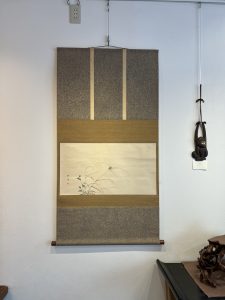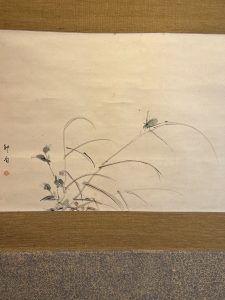「虫の音」は癒されるのか?(愛知県名古屋市千種区姫池通 骨董買取 古美術風光舎)
2024.09.10
みなさまこんにちは、スタッフYでございます。
9月って、とても不思議な季節ですよね。昨日もここ名古屋は大変暑かったのですが、寝静まる頃になりますと、どこからか鈴虫やコオロギの虫の音が聞こえてきます。虫や動物たちはこの気候の変化にどう対応しているのか気になりますが、久しぶりに開けた窓から虫の音が聞こえてくると、全身の力が抜けたいへん癒されました。
先日何かで知ったのですが、この虫の音で癒されるのはどうやら日本人くらいだそうして、西洋人の方にとってはこの虫の音はどうやら雑音といいますか、もはや聞こえていないらしい。「え?本当にこの虫の音聞こえない?」と、問いただしてしまいそうですが、不思議ですよね。

それは何故なのか、東京医科歯科大学の角田忠信教授がご自身の体験に基づき研究なさったとても興味深い研究内容がありました。簡単にご紹介させていただきますね。
角田教授、キューバの学会に参加された際、会場の周りで「虫の音」が蝉しぐれのように激しく聞こえているのに、どうやら他の方にはその「虫の音」が聞こえていないことに気づき、日本人の耳と外国人の耳は違いがあるようだと考え研究をされたそうです。
人間の脳は右脳と左脳とに分かれ、それぞれ得意分野があります。右脳は音楽脳とも呼ばれ、音楽や機械音、雑音を処理し、左脳は言語脳と呼ばれ、人間の話す声の理解など、論理的知的な処理を受け持ちます。
この機能は日本人も西洋人も一緒なのですが、虫の音をどちらの脳で聴くかという点で違いが見つかったそうでして。西洋人は虫の音を機械音や雑音と同様に音楽脳で処理するのに対し、日本人は言語脳で受けとめる、つまり、日本人は「虫の音」を「虫の声」として聞いているということになることをつきとめたそうです。
さらに西洋人は、激しい「虫の音」も、いつもの騒々しい雑音だと慣れてしまえば、意識にのぼらなくなってしまうらしく、例えば、日本人でも線路沿いに長年住んでいれば、騒音に慣れて、電車が通っても意識しなくなってしまうのと同じ現象だそうです。しかし、日本人は、「虫の音」を人の声と同様に言語脳で聞いているので、雑音として聞き流すことはできないため、学会の発表と激しい虫の音は、教授の左脳でぶつかって聞こえていたということです。
それにしても、おんなじ虫の音をどちらの脳で処理するのかで、癒し⇔雑音と対局の捉え方になって、もはや「聞こえない」レベルになっていくと、これは同じ人間でなのか…と、思ってしまいそうですが、逆に西洋人にとっては「え?この虫の音が癒し⁈」と、捉えられるのでしょう。どうなってるんだ…脳は。
ちなみに、不思議なことにこのような特徴は、世界でも日本人とポリネシア人だけに見られ、中国人や韓国人も西洋型を示すそうでして、この「虫の音」を日本人が言語脳で処理し、西洋人は雑音として処理していることは、そもそもその文化の違いによるもののようです。
西洋人は、虫=害虫という認識がありその鳴く音も雑音だと認識するようですが、日本人は「虫の音」に聴き入る文化が子どものころから親しまれているので、「虫の音」を人の声と同様に言語脳で聞いているのではないかということです。「虫の音」と同様に、日本人は言語と同様の左脳で聴き、西洋人は楽器や雑音と同じく右脳で聴いている音は他に「波」「風」「雨の音」「小川のせせらぎ」などがあるそうですが、たしかにそれらの音はどれも我々にとっては大概雑音ではなく、「癒し」と捉えらえる音ですよね。
それもそのはず、日本人の「虫の音」大好きの歴史は古く、すでに平安時代にはかごに入れた虫の鳴き声を楽しむのが貴族の風流な遊びとしての記録があり、虫の音にやすらぎを感じるのは古くからあったようです。
かの清少納言の「枕草子」の「虫は」という章では「虫は鈴虫。ひぐらし。蝶。松虫。きりぎりす。はたおり」と、好ましい虫として鳴く虫が挙げられていますし、「新古今和歌集」(13世紀)にもキリギリスを詠った歌がみられております。また、虫の鳴き声を楽しむ文化は、江戸時代になって庶民にも広り、飼育技術も進歩し、竹細工のかごに入ったスズムシやコオロギなどが「虫売り」たちによって庶民に売られるようになったようです。このように日本では、古くから虫の鳴き声を楽しんでいたようですね。
では、現代では秋の虫の声はどれほど好まれているかといいますと、ウェザーニュースで「秋の虫の声好き?」というアンケート調査を実施したところ、「大好き」の29%も含め、「好き」と答えた方の割合が94%にも上りました。

それにしても、そもそもの人間の脳は同じつくりでしょうから「虫の音」をどうとらえて育ってきたかの文化の違いで脳の構造までも変わってくるとは、癒しにせよ騒音にせよ、文化の違いによって音が脳にそんなに影響するとは興味深いものでありました。
とはいえ、私の脳はやはり左脳で虫の音を処理いているようですので、ここしばらくはこの「虫の音」に癒されたいと思います。かなり癒されてますが笑。
それではごきげんよう。
Hello everyone, this is Staff Y.
September is a very mysterious season, isn’t it? It was very hot here in Nagoya yesterday, but as soon as I fell asleep, I could hear the sound of bell bugs and crickets coming from somewhere. I wonder how insects and animals are coping with this change in climate, but for the first time in a long while, the sound of insects coming through my open window relaxed my whole body and soothed me very much.
The other day I learned from something that only Japanese people are soothed by the sound of insects, and that for Westerners, the sound of insects is considered noise, or they don’t even hear it anymore. What? You might ask, “Do you really not hear the sound of these insects? I might ask, but it is strange, isn’t it?
Professor Tadanobu Tsunoda of Tokyo Medical and Dental University has conducted a very interesting study based on his own experience. Let me briefly introduce his research.
When he attended an academic conference in Cuba, Professor Tsunoda noticed that the “sound of insects” around the conference venue was like a cicada’s whistling, but other people did not seem to hear the “sound of insects.
The human brain is divided into the right brain and the left brain, each of which has its own specialty. The right brain, also called the musical brain, processes music, mechanical sounds, and noises, while the left brain, called the language brain, handles logical and intellectual processing, such as understanding human speech.
Japanese and Western people share this function, but a difference has been found in which brain is used to listen to insect sounds. He found that Westerners process insect sounds in their musical brains as if they were mechanical sounds or noises, whereas Japanese people process them in their linguistic brains, which means that Japanese people hear “insect sounds” as “insect voices.
Furthermore, it seems that Westerners become accustomed to the intense “sound of insects” as a usual noisy noise, and it does not even register in their consciousness. However, Japanese people hear “the sound of insects” in their language brain just like human voices, so it is impossible for them to ignore it as noise, so the professor’s left brain heard the conference presentation and the intense sound of insects colliding with each other.
However, depending on which brain processes the same sound of an insect, it can be perceived as healing or noise, and when it reaches the level of “I can no longer hear it,” one might wonder if it is the same human being…but on the other hand, for Westerners, “What? I guess Westerners would see the sound of insects as healing. What is going on with my brain?
Incidentally, this characteristic is found only among Japanese and Polynesians, and Chinese and Koreans also show the Western type.
Westerners are aware that insects are pests, and they perceive the sound of insects as noise, but Japanese people have been familiar with the culture of listening to the sound of insects since childhood. Similar to the “sound of insects,” there are other sounds that Japanese listen to with their left brain like language and Westerners listen to with their right brain like musical instruments and noises, such as “waves,” “wind,” “rain,” and “babbling brooks.
It is no wonder that Japanese people have a long history of love for the sound of insects. As early as the Heian period (794-1185), there were records of aristocrats enjoying the sound of insects in baskets as an elegant pastime, and it seems that people have long felt comforted by the sound of insects.
In the chapter “Insects” in Sei Shonagon’s “The Pillow Book,” the author says, “Insects are bell bugs. A Japanese bush warbler. Butterflies. Pine insects. Kirigirisu. In the “Shinkokin Wakashu” (13th century), there is a poem about a grasshopper. The culture of enjoying the chirping of insects spread to the general public in the Edo period (1603-1867), and breeding techniques advanced, with insect vendors selling insects such as Japanese water bugs and crickets in bamboo cages to the general public. Thus, it seems that people in Japan have been enjoying the sound of insects since ancient times.
In a survey conducted by WeatherNews, the respondents were asked, “Do you like the sound of insects in autumn? The percentage of respondents who answered “I love the sound of insects in autumn” was as high as 94%, including 29% who answered “I love the sound of insects in autumn.
It is very interesting to see the relationship between sound and brain structure, whether it is healing or noise, and how it affects the brain.
However, it seems that my brain still processes the sound of insects in the left side of my brain, so I would like to be healed by the “sound of insects” for a while. I am quite healed.
Have a good day.

*******************
ご実家の整理やお片付けなどをされている方のご相談などが多くございます。
お片付けなどくれぐれもご無理のないようになさってくださいませ。
風光舎では古美術品や骨董品の他にも絵画や宝石、趣味のお品など様々なジャンルのものを買受しております。
お片付けをされていて、こういうものでもいいのかしらと迷われているものでも、どうぞお気軽にご相談下さいませ。
また風光舎は、出張買取も強化しております。ご近所はもちろん、愛知県内、岐阜県、三重県その他の県へも出張いたします。
なお、毎月21日の持込鑑定会では無料鑑定・買取・ご相談など、ご予約なしで承っております。
ご近所の皆さま、ご遠方のみなさまも、お気軽にお越しくださいませ。
まずは、お電話お待ちしております。
愛知県名古屋市千種区姫池通
骨董 買取【古美術 風光舎 名古屋店】
TEL052(734)8444
10:00-18:00 OPEN
#出張買取#骨董#古美術#骨董品#絵画#版画#茶道具#刀剣#彫刻

